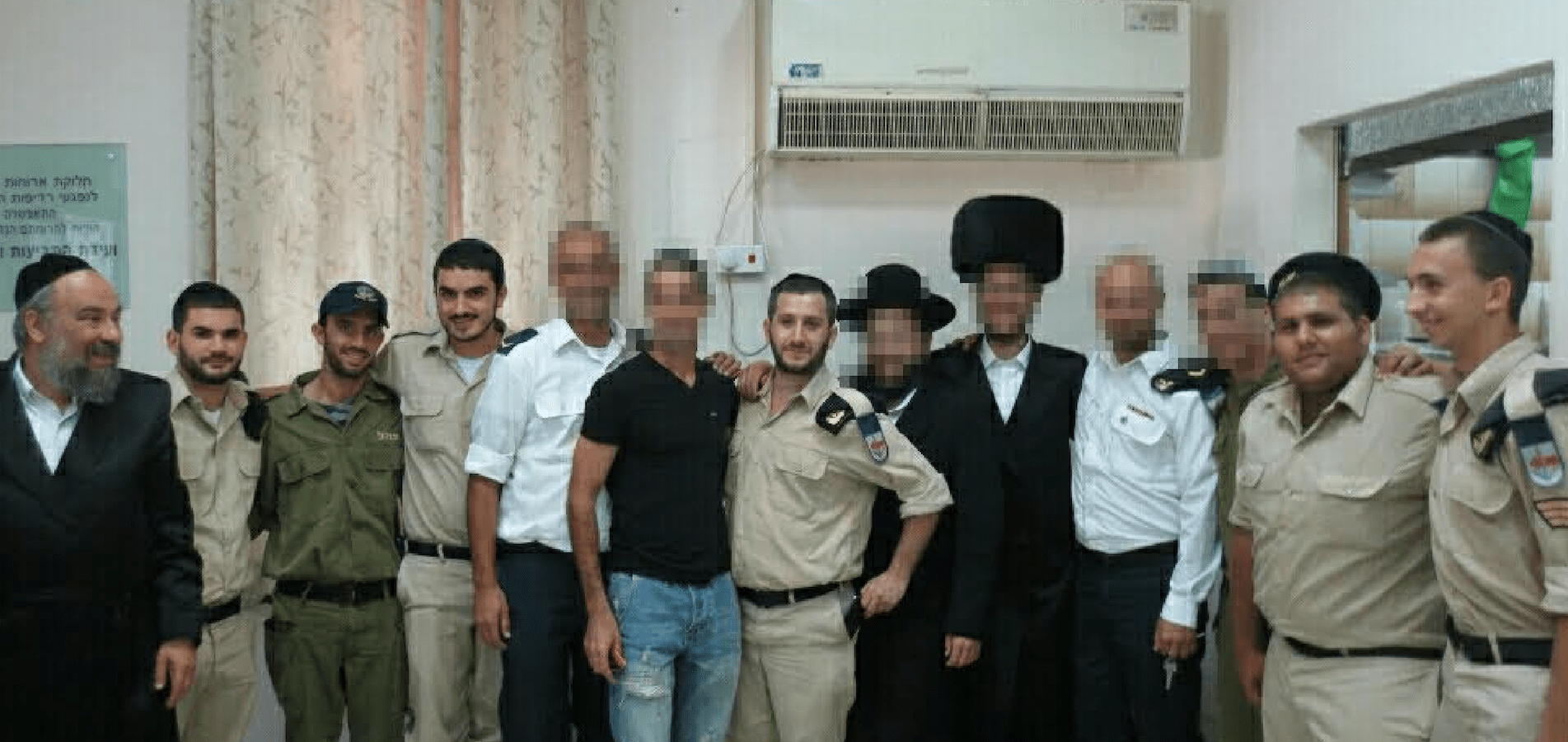
I’m A Hasid Who Joined the IDF. Here’s Why.
I grew up in a Hasidic home in the Har Nof neighborhood of Jerusalem and studied in Hasidic yeshivas until I got married. Because soldiers are considered heroes in Israel, most Israeli children, even haredim, dream of joining the IDF. I never believed that my dream would come true, though, until the day I met a Hasidic young married man who worked in the field of air conditioning. He learned his profession during his service in the Navy. After seeing his professional work and the quality of religious/Hasidic observance, with the encouragement of my family and mentors, I decided to follow my childhood dream and enlist in the IDF, which I did after my wedding.
There are many reasons I joined the IDF, but the reason that stands out the most is the idea that you are part of a big and important project that really needs you. I’ll share with you a situation that exemplifies the idea that “if you are not there, nobody will be there”.
One year, on the eve of Yom HaZikaron, almost everyone left the base early. I was delayed working on a ship that needed some more work before it could sail. When I was done, I saw the last of my colleagues in their “dress uniform” (“Madei Alef” in Hebrew), getting ready to leave base. Intending to join them, I took my “dress uniform” off the hanger, when the “chief” (lingo for captain) of one of the ships approached me with some part of a critical system that needed repair.
A little embarrassed, he said, “I can’t sail if this part isn’t fixed.”
It was very obvious that he knew that this was the last thing any of us wanted to do then.
In the meantime, I saw all of my colleagues putting on their dress shoes and leaving the base.
I took the part from the hands of the “chief,” and after a quick glance, I realized that this was not a 5 minute job. I got a feeling at that point that this scenario was going to recur many times during my service. “If I, the newbie, don’t get this ship seaworthy, no one else will do it either, and the ship will remain docked here unable to carry out its mission.”
After a few hours of work, I changed into my “dress uniform.” I went home and the ship went out to the sea. Once more, I had that special feeling that I was contributing to this large and important outfit. And of course, the tremendous Kiddush Hashem, where the Captain sees the entire department dispersing and one lone ultra-Orthodox soldier stays behind. [To be honest, if he was eating the rhetoric fed by the media, “which loves us so much” I wondered what he thought of me up until this event …]
From a religious perspective there are amazing moments that I will never forget. For example, once, after an exhausting week at sea, our ship was sailing somewhere in an ocean that I can only describe as “the middle of nowhere.” We were totally drained, and then the Shabbat arrived. Suddenly, secular and religious soldiers were singing Lecha Dodi. We made Kiddush to the light of the moon, on the ship’s bridge, and sang Shabbat songs together. That feeling was amazingly uplifting! These are moments that most people won’t ever experience. These are great uplifting encounters, moments of great exhilaration.
I enlisted at a sensitive time just before the big demonstrations against the plans to coerce recruitment of yeshiva students, and I personally felt very bad about the talk of forcing Yeshiva students to enlist. I was not forced to enlist at all. My legal status was in order, and the law did not require me to be drafted. Nevertheless, I felt very bad about the public face of the Haredim, the derogatory names they used about us. Even though I was already in the middle of the recruitment process, I fully participated in that demonstration. It bothered me that people were willing to tarnish an entire beautiful community, that I am part of, for their political gains.
The reactions of the family and friends were warm and encouraging. I live in Haifa; it’s not so rare to see a soldier with a beard and payot, so there was no problem within the community. After basic training, I was warmly welcomed by the commanders and the younger recruits of the Haifa naval base.
In time, I advanced and became a team leader; I felt greatly respected by my colleagues, and I had tremendous satisfaction. Before the High Holidays, I was asked to speak to the sailors about the nature and meaning of the upcoming days. (Most of the people at the base just assumed that I was the chaplain and Kashrut supervisor!)
I always made sure not to speak too long and burden the members of the unit. Unlike a typical “derasha” (sermon) given to civilians, in the army you have to pay attention – and that’s an order. In my attempt to make the talks more accessible, I built on our mutual experiences as sailors. For example: On the eve of Rosh Hashanah I explained to them that just like the dirtiest and most unpleasant room on a ship is the machine room – noisy and filthy from the engines’ rumblings and soot – it is precisely this room that makes a raft into a ship. It is the “brains” of the ship. So too, with Rosh Hashanah, for many people praying and making requests of G-d doesn’t come naturally, but it is our “Rosh” our “engine room” with all the dirt and soot, and without it, life won’t work properly.
On Israel Independence Day of 2016, I was awarded two commendations for outstanding service, from the Commander of the Navy, Major General Ram Rotberg, and from the Commander of the Haifa Base Brig. Gen. David S. Salameh. I would like to commend my commander, Roni. He is one of the most amazing people I have ever met. To summarize his credo, “one hand washes the other.” It does not matters where you come from or what demographic you are part of. The attitude toward you is the result of your actions. When you think about it, it’s amazing how true it is in all areas of life.
I still serve many days in reserve duty, as a ‘supervising technician’ of systems on ships and other vessels in the Israeli Navy. In my civilian life, I am self-employed as a certified electrician and air-conditioner installer. Kudos to my wife who remains at home with our 6 year old daughter and 2 year old son when I go to reserve duty and has to manage on her own. We never know in advance when I will be called to reserve duty and for how long it will be. I also can’t tell her any details about my trips because they are highly-classified.
A beautiful moment that sums up how I was received inside and outside of the community occurred during the bris of my son Ruvy which took place in the Shtibel (Hasidic synagogue) where I usually pray. In the crowd were Hasidic yeshiva men wearing long coats and black hats, standing side by side, shoulder to shoulder, with the soldiers and officers, improvised white kipot on their head, all the while showing respect to each other. We all sat at the meal and sang Hineyi Matov U’mana’im Shevet Achim Gam Yachad.
If you found this content meaningful and want to help further our mission through our Keter, Makom, and Tikun branches, please consider becoming a Change Maker today.







1 comment
Sort by
What a wonderful story!
So much inspiration in one person